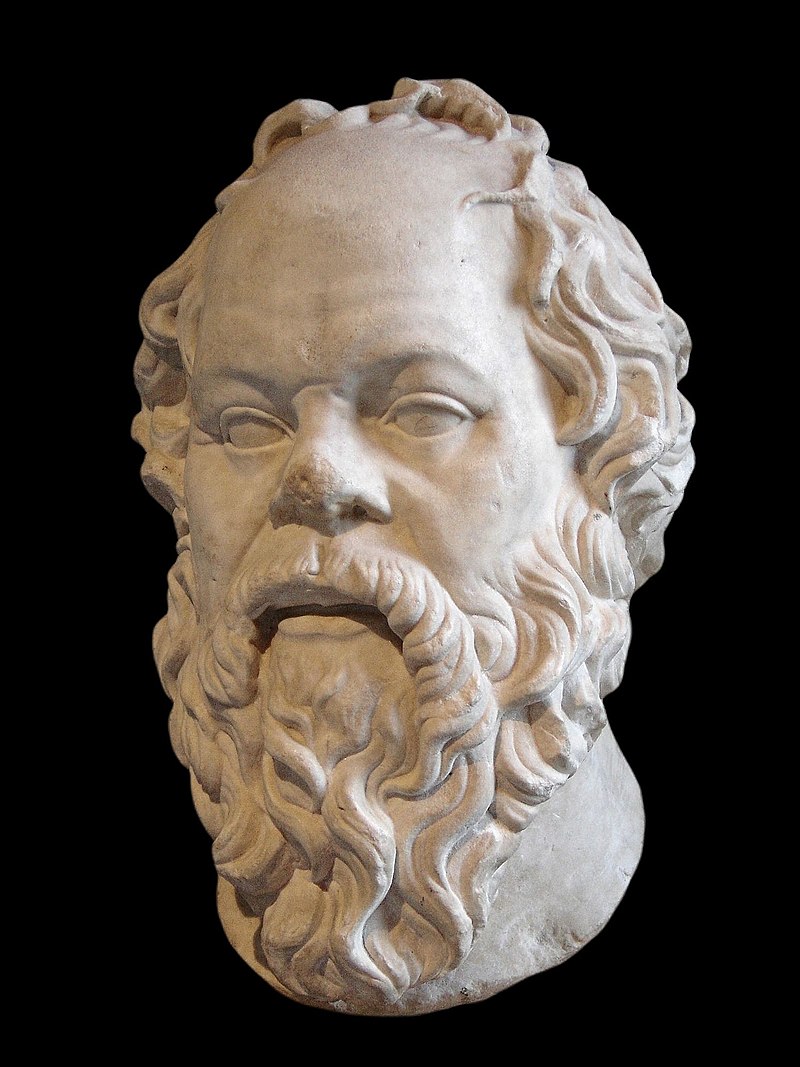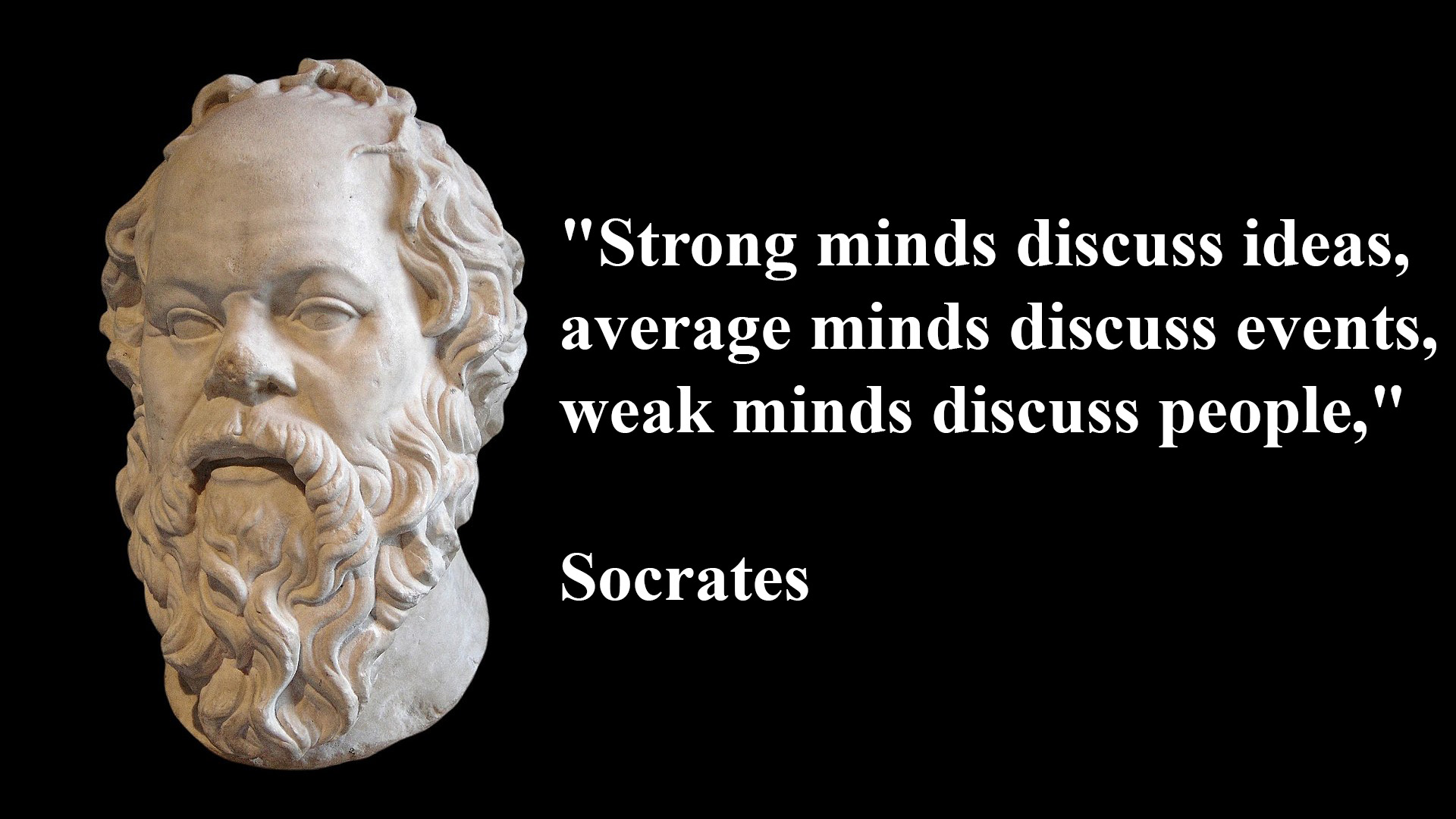
Socrates was an ancient Greek philosopher who lived in Athens during the 5th century BC. He is considered one of the founders of Western philosophy and played a crucial role in shaping the philosophical tradition of his time.
“Strong minds discuss ideas, average minds discuss events, weak minds discuss people,” is often attributed to Socrates, although there is some debate about its exact origin, for example in modernity a modified form of this is often attributed to Elenor Roosevelt who said:
“Great minds discuss ideas; average minds discuss events; small minds discuss people.”
The truth is of course that human beings don’t tend to be original thinkers making this a universal realisation that keeps on popping up in all places and all times which is why some sources attribute the quote to Henry Thomas Buckle, an English historian who lived in the 19th century. However, like with Eleanor Roosevelt, there is limited evidence to verify this claim. Meanwhile others, attribute it to David McCullough, an American author and historian known for his biographies. However, there is no strong evidence to support this attribution either.
It’s worth mentioning that the true origin of this quote is uncertain, and it is possible that it originated anonymously and was later associated with various notable individuals. As with many popular quotes, the exact source can be difficult to trace definitively as language can change and vary with the times even though the sentiments remain broadly the same.
Both Seneca and Marcus Aurelius, who were Stoic philosophers in ancient Rome, expressed similar sentiments regarding the nature of discussions and the focus of the mind.
Seneca, a prominent Stoic philosopher and statesman, wrote in his essay -On Tranquility of Mind:
“Men who are devoid of goodness cannot be saved by any other means than by closing their ears to the tales of the streets, and the snares of rumour, and the nets spread by human gossip.”
This passage emphasizes the importance of avoiding idle gossip and rumors, suggesting that focusing on such matters distracts individuals from attaining inner peace and virtue.
Marcus Aurelius, the Roman Emperor and philosopher, also reflected on the topic in his personal writings known as “Meditations.” He wrote:
“How much time he gains who does not look to see what his neighbour says or does or thinks, but only at what he does himself, to make it just and holy.”
This statement encourages individuals to direct their attention inward and focus on self-improvement, rather than being preoccupied with the opinions and actions of others.
While these quotations do not match the exact wording of the quote attributed to Socrates, they convey a similar message. They emphasize the importance of directing one’s mind towards noble and virtuous pursuits, rather than engaging in idle talk or being consumed by the actions and opinions of others.
According to Socrates, a strong or superior mind is characterized by its inclination to engage in thoughtful and meaningful discussions about ideas. Such individuals prioritize the examination and exploration of abstract concepts, theories, and principles. They seek to understand the nature of things, question assumptions, and critically analyse various perspectives.
Average minds, in Socrates’ view, tend to focus on discussing events. This refers to the ordinary occurrences and incidents happening in the world. These individuals are more interested in the superficial aspects of life, such as current affairs, news, and everyday happenings.
On the other hand, weak minds, according to Socrates, are prone to discussing people. This implies that they primarily engage in gossip, rumour-mongering, and idle chatter about others. They focus on personal matters, social interactions, and the actions or characteristics of individuals, rather than engaging with more substantial intellectual or philosophical topics.
Socrates’ quote can be interpreted as a call to prioritize intellectual discourse and critical thinking over shallow or trivial matters. It encourages individuals to elevate their discussions beyond the mundane and focus on ideas that have the potential to broaden their understanding of the world, because if we’re honest we must recognise that we probably all engage in talk of ideas, events, and people. This doesn’t make us bad people, but if we’re dedicated to self improvement, and the pursuit of virtue, not to mention peace of mind, then the quote from Socrates does give us a helpful guide as to where we can start. Together we can celebrate human excellence, by sharing the words, deeds and accomplishments of the finest minds in history making them our friends as we do so.


